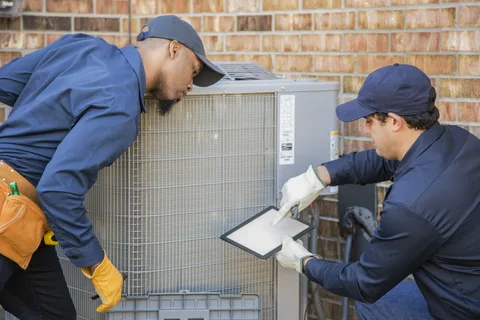10 Signs Your HVAC System Needs Immediate Repair
- Hassan Siddiqui
- September 22, 2024
- No Comments
Your HVAC (Heating, Ventilation, and Air Conditioning) system is vital to maintaining a comfortable and healthy indoor environment, regardless of the season. However, like any complex machinery, HVAC systems can develop issues over time that require prompt attention. Ignoring these problems can lead to more significant and costly repairs, or even a complete system breakdown. In this blog, we’ll cover the top 10 signs that indicate your HVAC system needs immediate repair.
1. Strange Noises
One of the most obvious signs that your HVAC system is in trouble is the presence of unusual noises. While most systems produce some sound during operation, loud banging, clanking, hissing, or grinding noises are clear indicators of a problem. These noises can be caused by loose or broken parts, a failing motor, or issues with the blower. If you hear anything unusual, it’s crucial to call a technician right away to prevent further damage.
2. Unpleasant Odors
Your HVAC system should not emit any noticeable odors. If you detect a burning smell, it could be due to overheating components or electrical issues. A musty odor, on the other hand, may indicate mold or mildew growth in the ducts or within the system itself. Both scenarios require immediate attention, as they can pose health risks and reduce indoor air quality. Have a professional inspect the system to identify and resolve the source of the odor.
3. Inconsistent Temperatures
If you notice that some rooms in your home are warmer or cooler than others, it could be a sign that your HVAC system is struggling to distribute air evenly. This issue could be due to a malfunctioning thermostat, blocked vents, or problems with the ductwork. Inconsistent temperatures not only make your home less comfortable but also indicate that your system is working inefficiently, which can lead to higher energy bills.
4. Frequent Cycling
Your HVAC system should operate in regular cycles, turning on and off as needed to maintain the desired temperature. If you notice that your system is cycling on and off more frequently than usual, it could be a sign of a malfunctioning thermostat, clogged filters, or other underlying issues. Frequent cycling puts extra strain on your system, leading to increased wear and tear and higher energy consumption. Addressing this problem early can prevent further damage to your system.
5. Weak Airflow
Weak or reduced airflow from your vents is a common sign of HVAC issues. This could be caused by clogged air filters, blocked or leaky ductwork, or a failing blower motor. Weak airflow makes it difficult for your system to maintain a comfortable temperature, leading to increased energy use and strain on the system. If you notice weak airflow, it’s important to have your system inspected to identify and fix the problem.
6. Rising Energy Bills
A sudden increase in your energy bills without a corresponding increase in usage is a red flag that your HVAC system is not operating efficiently. Several factors can contribute to this, including dirty filters, duct leaks, or failing components. Rising energy bills are often an early sign of a system that is struggling to perform its job, and addressing the issue promptly can save you money in the long run.
7. Excess Humidity or Dryness
Your HVAC system plays a crucial role in regulating indoor humidity levels. If you notice that your home feels unusually humid in the summer or excessively dry in the winter, it could indicate a problem with your system. High humidity levels can lead to mold growth, while low humidity can cause dry skin, respiratory issues, and damage to wooden furniture. An HVAC technician can assess your system and recommend solutions, such as installing a humidifier or dehumidifier, to maintain proper humidity levels.
8. Water Leaks
Your HVAC system should not leak water. If you notice puddles or moisture around your indoor unit, it could be due to a clogged condensate drain line, a refrigerant leak, or other issues with the system’s components. Water leaks can lead to water damage, mold growth, and reduced system efficiency. It’s important to address any leaks as soon as possible to prevent further damage to your home and HVAC system.
9. Poor Indoor Air Quality
If you or your family members are experiencing increased allergy symptoms, respiratory issues, or frequent colds, your HVAC system may be contributing to poor indoor air quality. This can be caused by dirty filters, mold or dust buildup in the ductwork, or an improperly functioning system that fails to filter and circulate air effectively. A professional inspection can help identify the cause and restore your home’s air quality.
10. The System Is Old
While not a sign of immediate trouble, the age of your HVAC system is an important factor to consider. Most systems are designed to last between 10 to 15 years. If your system is approaching or exceeding this age range, it may be more prone to breakdowns and require more frequent repairs. In some cases, it may be more cost-effective to replace an aging system with a newer, more efficient model rather than continue to invest in repairs.
Conclusion
Recognizing the signs that your HVAC system needs immediate repair can help you address problems before they escalate into more significant and costly issues. If you notice any of the warning signs mentioned above, it’s essential to contact a professional HVAC technician for a thorough inspection and necessary repairs. By staying proactive with your system’s maintenance and addressing issues promptly, you can ensure that your HVAC system continues to provide reliable comfort and efficiency for years to come.

